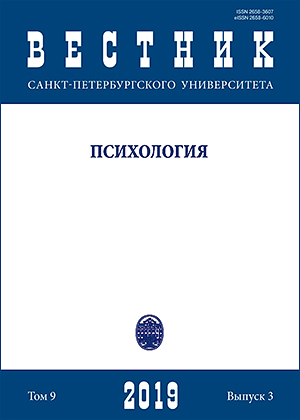Possibilities of psychological diagnosis of social intelligence in the context of life course
DOI:
https://doi.org/10.21638/spbu16.2019.307Abstract
This article deals with the subject characteristics of the personal life course of people with different levels of social intelligence. The social intelligence and subjective characteristics of individuals’ life course (life orientations, subjective picture of life course, life course strategies) are studied. The sample group was composed of external students of the Herzen State Peda- gogical University of Russia aged 19–48 (n=73; μ=26.18; σ=6.93; male — 25, female — 48). Research methods included different tests and questionnaires measuring the degree of mani- festation of various aspects of social intelligence (Tromso Social Intelligence Scale, TSIS, Sil- vera D.H., Martinussen M.& Dahl T.I., translated by V.Y. Semenov, edited by A.A.Alekseev); Guilford’s Test of Social intelligence; the method called “Diagnostics of the level of develop- ment of abilities for an adequate interpretation of nonverbal behavior” (V.A.Labunskaya); the author’s questionnaire “The significance of social intelligence in a person’s life trajectory” (V.V. Shevelev). For the diagnosis of the subject characteristics of a person’s life course, we selected the following methods: “Questionnaire of subject-object orientations in life situations” (E.Yu. Korjova); methods “Psychological Autobiography” (E.Yu. Korjova) and “The indicator of coping strategies” (adapted by D.Amirkhan). In addition, we researched the most important psychometric characteristics of the psychological tests used. In particular there were some unsatisfactory psychometric characteristics discovered in J.P.Guilford’s Test of Social Intelligence and V.A.Labunskaya’s test to diagnose ability to perceive non-verbal human behavior. Using the EFA, a three-factor structure of social intelligence was found. It was shown that these factors have different correlations with subjective characteristics of personal life courses depending on the individual’s level of social intelligence.
Keywords:
social intelligence, social skills, life course, life course orientations, life course strategies, subjective picture of the life course
Downloads
References
References
Downloads
Published
How to Cite
Issue
Section
License
Articles of "Vestnik of Saint Petersburg University. Psychology" are open access distributed under the terms of the License Agreement with Saint Petersburg State University, which permits to the authors unrestricted distribution and self-archiving free of charge.




